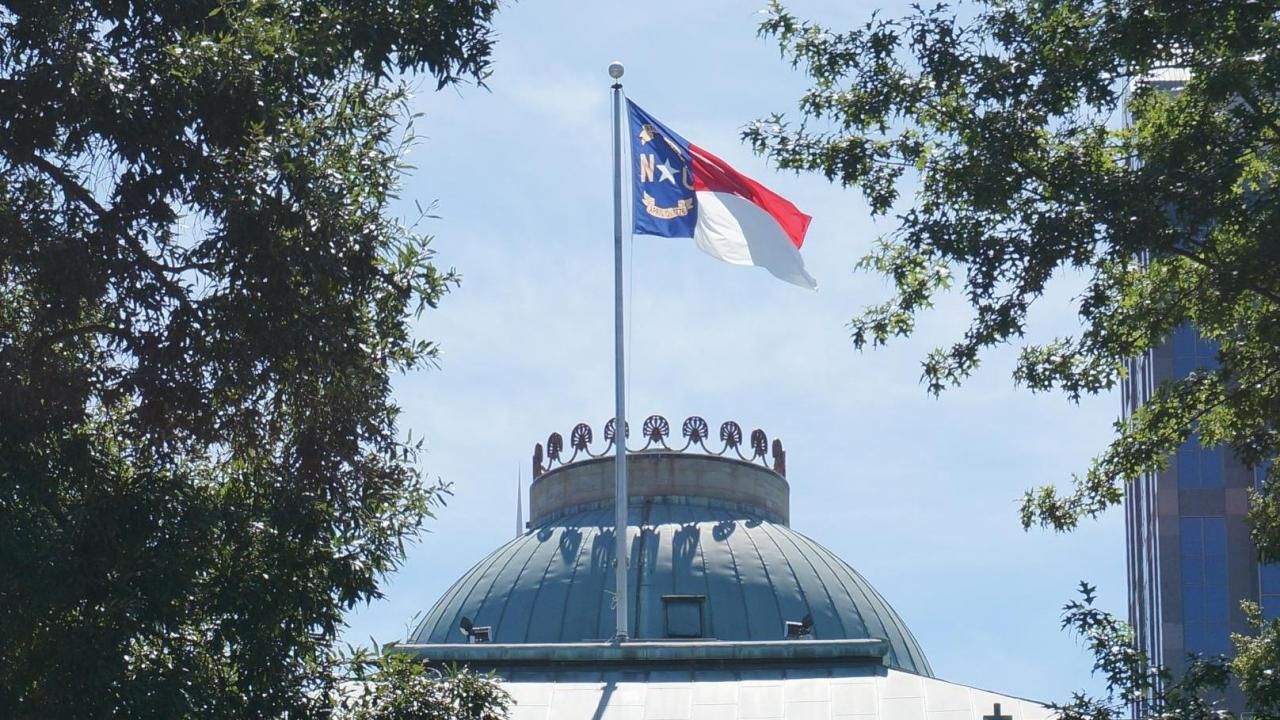
As the legislative session nears an end, Republican leaders rolled out several proposed changes to the state constitution to put before North Carolina voters this fall.
Posted 2024-06-26T18:16:04+00:00 - Updated 2024-06-26T22:45:25+00:00
House lawmakers on Wednesday unveiled three proposed constitutional amendments to appear on the ballot in November.
One passed the House with broad bipartisan support Wednesday, on citizen-only voting. But two other proposals were expected to be more politically contentious — and House Speaker Tim Moore pulled them off the legislative calendar Wednesday night, indicating Republicans didn't have enough votes to pass them. The House could try again Thursday.
Constitutional amendments require a 60% supermajority, rather than a regular 50% majority, to pass the state legislature and be put on the ballot. Republicans hold a supermajority in each chamber, but only by a single vote.
Once on the ballot, however, amendments only need 50% support from voters to be added to the constitution.
The state Senate is also pushing to add three amendment proposals to the ballot this year, with a vote expected in that chamber Thursday.
But while the House and Senate have now each proposed three constitutional amendments, they’re not in total agreement on what those amendments should be.
The chambers agree on two amendments — addressing rules about voter photo identification and on citizen-only voting — indicating those two changes are likely to be put on the ballot this fall.
But GOP leaders in each chamber have different ideas about what else should be added to the constitution. The Senate has proposed lowering the state’s maximum allowable income tax rate. The House on Wednesday proposed restricting the governor’s ability to replace fellow executive branch officials who leave office.
The one amendment the House passed Wednesday, House Bill 1074, would change the language of the state constitution to specifically state that only citizens can vote. That’s already the rule in North Carolina, but the new language would tweak the way it’s written.
The constitution currently says “Every person born in the United States and every person who has been naturalized” is entitled to vote. The new version would change that to “Only a citizen of the United States.”
Critics said the amendment is unnecessary because the two versions have the same meaning, but supporters said it’s needed because some cities in other states have considered allowing resident non-citizens to vote in local elections.
“Feeding into conspiracies and drumming up irrational fears is not befitting of this body,” said Rep. Alan Buansi, D-Orange. But in the end it passed the House with broad bipartisan support as every Republican — and most Democrats — voted to approve the constitutional amendment proposal. It passed 104-12.
The Senate has also proposed the exact same change, indicating the proposal is likely to be put on the ballot this fall.
Another proposed amendment hat moved forward in committee the House Wednesday before being pulled from the House floor, a rewrite of Senate Bill 356, would add to the constitution the requirement for photo identification to be submitted by people who vote by mail.
That’s already required by state law, but adding it to the constitution would make it harder for future legislatures or courts to undo. Voters passed a similar constitutional amendment in 2018 requiring photo identification to vote in person. The Senate has also proposed this amendment, indicating the proposal is likely to be put on the ballot this fall, if the two chambers can muster enough GOP members to pass it.
The third proposed amendment in the House, House Bill 74, which also didn't get a final vote Wednesday, would change how most elected Council of State members are replaced if they resign, die or otherwise don’t complete their term. Under current law, the governor appoints a replacement of his or her choice. The amendment would require the governor to choose among three nominees submitted by the political party of the original member.
The lead sponsor Rep. Kyle Hall, R-Stokes, said the same process is used to replace a U.S. senator when necessary.
“The voters in North Carolina not only elect the person, but they also elect the political party to serve in that position,” Hall told the House Rules Committee.
The offices of governor and lieutenant governor would not be included in the change. If the governor steps down, they’re replaced by law by the lieutenant governor, and if the lieutenant governor steps down, the governor would still be able to choose their replacement. The changes restricting the governor’s power to pick replacements would apply to the other eight executive branch offices that voters elect, including the attorney general, auditor and treasurer.
Senate leaders have proposed a fourth amendment that would cap the state income tax at 5%, down from 7% currently. As of Wednesday, the Senate has not yet voted on it or any of its proposals.
If passed it would have no immediate effect since the state’s income tax rate is already at 4.5% for individuals and 2.5% for corporations. But critics say lowering the cap would put a future legislature in a tough spot in case taxes ever needed to be raised to address revenue shortfalls.
Since they require a veto-proof supermajority to pass the legislature in the first place, the governor has no power to veto amendments.
In 2018 voters approved three of the five amendments the Republican-led legislature put on the ballot. No amendments have been approved since then; this is also the first time since 2018 that Republicans have regained the legislative supermajorities needed to propose amendments without needing any support from Democrats.